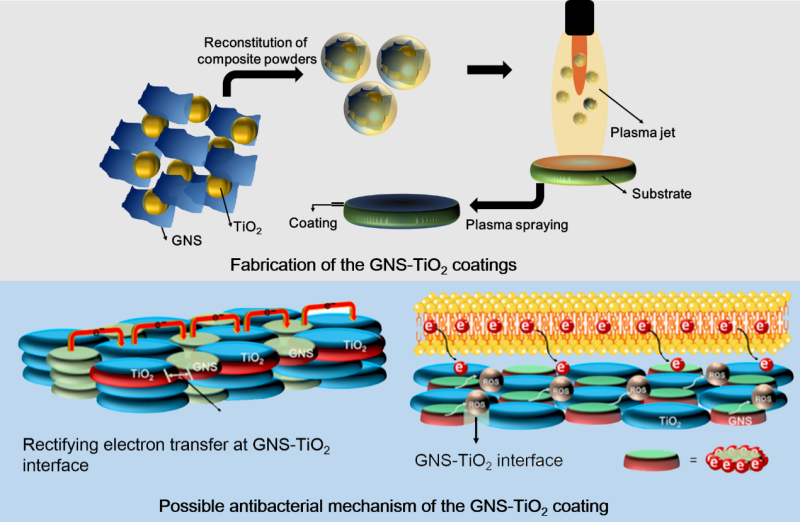Plasma Sprayed TiO2-Graphene Nanosheets Coating for Biocompatible Antibacterial Purposes
Date:20-07-2020 | 【Print】 【close】
A variety of antibacterial strategies have been proposed for implant surgery, but the in vivo cytotoxicity remains a big concern. Hence, there is an urgent need to develop antibacterial materials with better cytocompatibility.
Titania carries the potential in enhancing the implant biocompatibility and possesses promising photocatalytic antibacterial properties. It is noted that titania (TiO2) exists on all Ti-based implants due to surface oxidation, having strong bonding to the substrate.
However, titania loses its antibacterial function under dark conditions, for instance, in the human body. Therefore, it is of great importance to preserve the antibacterial functions of TiO2 for circumstances where light is inaccessible.
Graphene-based nanomaterials have strong antibacterial properties and good cytocompatibility. But when they are fixed on a substrate or embedded in a second phase matrix, it is difficult to preserve their antibacterial activity.
Recently, researchers from the Shenzhen Institutes of Advanced Technology (SIAT), the Chinese Academy of Sciences and Changzhou University made an exciting discovery that plasma sprayed titania coatings doped with a certain amount of graphene nanosheets (GNS) showed antibacterial activity under darkness, due to a mechanism associated with electron transfer.
The study, entitled "Electron Transfer Correlated Antibacterial Activity of Biocompatible Graphene Nanosheets-TiO2 Coatings", was published in Carbon.
The addition of GNS greatly improved the electric conductivity of the TiO2 coating. This design facilitated the transport of extraneous electrons in the bacteria, thus interfering with their normal respiratory electron transport chain. Consequently, the electron gathering and enrichment at the schottky-like GNS-TiO2 interface might lead to ROS generation, resulted in a remarkable antibacterial activity under darkness.
Besides, in vitro cell culture experiments confirmed that GNS-TiO2 composite coatings possessed comparable cytocompatibility with pure TiO2 coatings.
"The findings of this work will possibly diversify the application of graphene-based nanomaterials in the biomedical field, and provides new ideas for the design of biocompatible and effective antibacterial implant coatings," said Prof. WANG Guocheng.
This study was funded by the National Key R&D Program of China, the National Natural Science Foundation of China, Shenzhen Science and Technology Research funding, and Guangdong Provincial Science and Technology Project.

Possible antibacterial mechanism of the GNS-TiO2 coating (Image by SIAT)
ZHANG Xiaomin
Email: xm.zhang@siat.ac.cn